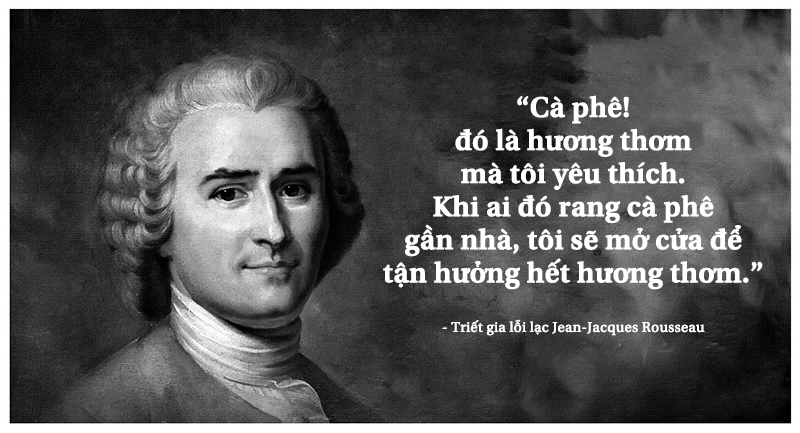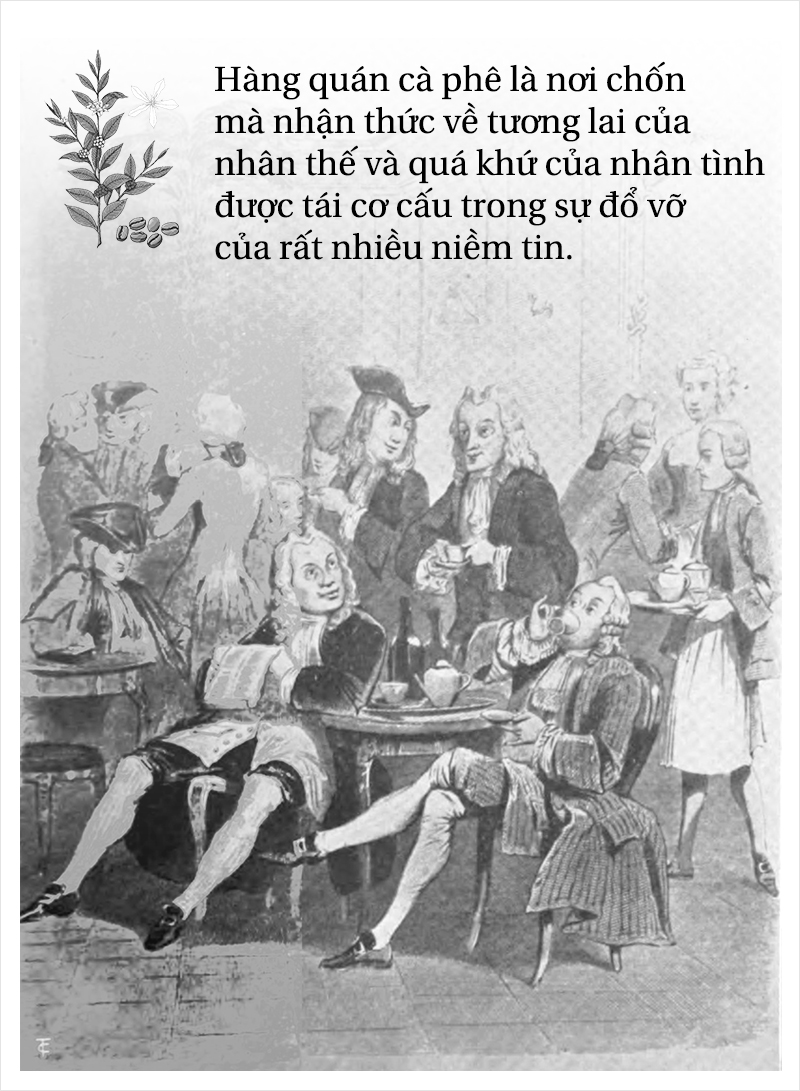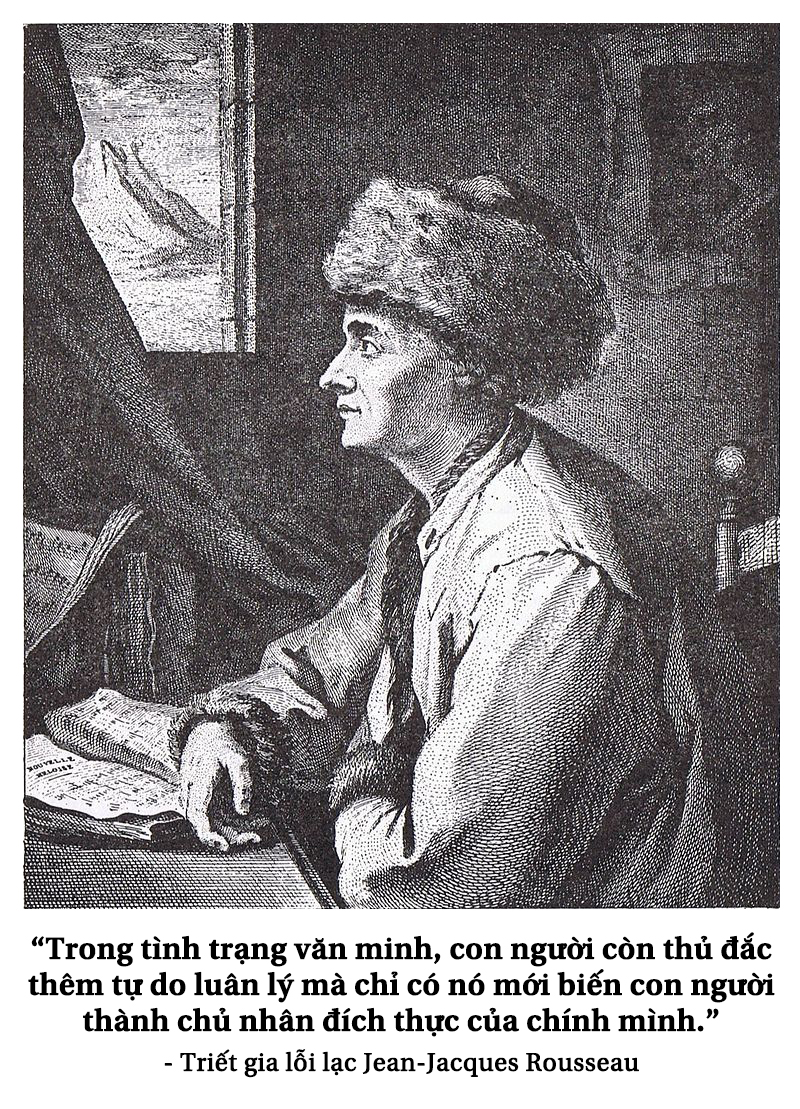Article 18: Philosopher Jean-Jacques Rousseau and the social aspiration “people should be Human”
The coffee space is a place that evokes the life wishes that the heart desires. As the philosopher Jean-Jacques Rousseau and his contemporaries envisioned a society that was benevolent to people.

“Coffee! That is a perfume in which I delight; when they roast coffee near my house, I hasten to open the door to take in all the aroma.” Jean-Jacques Rousseau
The crisis of modern consciousness and the concept of a benevolent humanity
Coffee was introduced to France in the 17th century, in the 18th century France experienced a brilliant development period, considered the era of “Light” (Siècle des Lumières). The Age of Light aims at the concept of enlightenment and progress, awakening people to overcome ignorance bias to develop the truth – goodness – beauty of humanity in spirit as well as material, thereby achieving a life of authentic freedom and happiness.
To understand the meaning of “Light” one must understand the origin that led to this era. From the middle of the 17th century, Europe fell into a crisis of consciousness (La Crise de la conscience européenne). People gradually realized the absurdity of political institutions that divided classes and human rights. People’s hearts still turned to almighty God but they doubted the ideology, worldview, and cosmology of the church, culminating in the development of natural science, the less faith people had in the religious doctrine. Powerlessness in the face of political and religious problems led to a loss of faith in oneself.
The crisis of consciousness hatched the idea of recreating a benevolent human community on earth, starting with the individual training of personality and reason, then spreading it to the masses. Scholars had become the elite with the mission of enlightening, disseminating truth, progressive ideas, and raising ethical standards in order to prepare spiritually and build a force for social transformation. In other words, “Spread the light of reason, virtue! Happiness will come right into your hands” is the general belief of this period.
From the above concept, the image of “Ideal Man” is formed with the essence of cherishing and practicing truth, goodness and beauty. Overcoming the evils of ignorance, greed, selfishness… and social imperfection, together progressing towards perfecting the lifestyle to pursue happiness.

The cafe is a place where the perception of the future of human positioning and the past of humanity is restructured in the breakdown of many beliefs.
Café Procope (opened in 1686) – one of the oldest cafes in Paris, became a place of dialogue and knowledge of the enlightened philosophers such as Voltaire, Diderot, d’Alembert, Rousseau, Montesquieu… It was also at this cafe that the Enlighteners gathered documentary knowledge from around the world to write the Encyclopédie – an encyclopedia to spread human knowledge about science, art, philosophy of freedom, equality… as a means for each individual to build their own wisdom and liberate themselves to achieve worldly happiness.
The Social Contract
Composing the Encyclopédie, but philosopher Jean-Jacques Rousseau (1712-1778) had a different thought from the majority of scholars of the time. He recognized the values of freedom and equality, but at the same time believed that in an ideal society, freedom and politics, religion would be harmonious and mutually supportive.
Despite the dissenting reactions, Jean-Jacques Rousseau still wrote essays on science, art, education, etc., trying to provide a model society. Among them, Rousseau’s most important and influential work is “The Social Contract”.
In the view of Jean-Jacques Rousseau, “At some point, human strength will not be enough to sustain his life in the face of obstacles caused by nature. Humanity will perish if it continues to live in its primitive state without seeking to improve it. Since man cannot create new powers, but only combines and manipulates the existing ones, he must find a way to unite all the forces beyond all natural weaknesses.”
Unity of power must ensure freedom for each individual, therefore, when writing “The Social Contract”, Rousseau sought the principle of establishing the state and governing according to the collective will.
Rousseau put the collective will at the top, because if everyone followed the will of the individual, society would be in chaos, humanity would retreat. And so, people need to give up their emotional lifestyle and connect with each other through a contract (Constitution/common agreement).
Once private interests are excluded from the individual, the social leader must find the best social norms appropriate to the nation. Rousseau said that a social leader must be “A person with a great mind. That wisdom clearly sees all human desires without favoring a single one. That wisdom is not related to the nature of each person but understands it thoroughly. The happiness of that wisdom is independent of humans but is concerned with human happiness. That wisdom builds up a noble career in this life for results in the next life.”

“In the civilized state, man also acquires more moral freedom, only which would make man his true master.” Jean-Jacques Rousseau
Rousseau also pointed out the practical difficulties if his theory were to be applied. “How can the people come up with wise collective wills?” The collective will is crystallized from the collective mind. Therefore, people need knowledge to understand the nature of things, identify social reality and the way to the common aspiration of society, ensuring that the collective will is not distorted by individual ambitions.
Thus, it is necessary to have a good education policy so that citizens can love their country, understand their duties, obligations and civic ethics. He affirmed that knowledge helps mankind to have a good life. Countries with responsible as well as educated citizens will understand the benefits of placing common aspirations above individual desires. A society built from a wise collective will would be heaven on earth, and people can live according to their Human nature.
Jean-Jacques Rousseau’s “The Social Contract” shows a profound humanity and philosophy of action, especially the attitude of respecting and upholding the role of the people’s collective will. Therefore, “The Social Contract” has contributed significantly to the formation of the US Constitution 1787 and the Universal Declaration of Human Rights in 1948. The Meirokusha Society (Japanese intellectual society) translated this classic work to be the intellectual foundation for the Japanese reform movement.
“The Social Contract” is also one of the 100 books that Founder and Chairman of Trung Nguyen Legend Group, Dang Le Nguyen Vu, wholeheartedly chose for the Life Changing Foundational Bookcase. The bookcase covers all the essential fields of life, unifies the quintessence of all humanity in order to build comprehensive wisdom for the Vietnamese, contributing to the creation of a model nation, leading to comprehensive wealth physically, materially, spiritually.
Indeed, at the same time as the Enlightenment age, the coffee space had become a historical space, a place where the perception of the future of the world and the past of humanity was restructured in the breakup of many beliefs. Coffee, from its characteristics, had become a symbol of the enlightenment of a whole era of awakening moving towards the light.
Coming up: Coffee Awakened Humanity – Italian style


